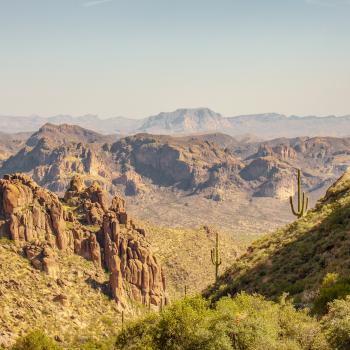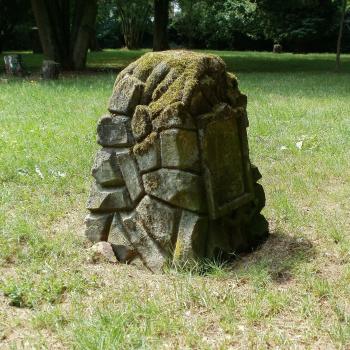Rhyd Wildermuth posted up a great roundup/linkage of the many discussions going on about polytheism right now. I won’t be linking to all the posts he links, so if you’re interested in reading, head over there. (And just head over there and spend some time reading his blog, as it is quality. And don’t forget to check out his writings on Sense of Place.)
I went over to read A Polytheist Manifesto by Julian Betkowski, which was a great read and very interesting, but I want to highlight some specific points that stood out to me:
Through this understanding of experience, Polytheism is capable of recognizing diverse and varied spiritual and religious potentials. Further, it understands these potentials on their own terms, without seeking to reinterpret them into some alien frame. Thus, I believe that Polytheism is capable of fostering an incredible tolerance and acceptance across various religious and spiritual understandings. It is not necessary for Polytheism to denounce one spiritual truth in order for another to be true. Polytheism can tolerate multiple truths simultaneously, even if those truths contain apparent contradictions. Being founded in experience, Polytheism allows for discrete spiritual experiences to carry equal weight, and to be considered on their own terms just as they present themselves.
This quote, in turn, reminded me of another paragraph I’d recently read, over on Aedicula Antinoi:
I think it is fully possible to be a politician, a business owner, or any number of other possible occupations or roles in society, have strong religious principles, and not seek to enforce them on all others around one. I think the mark of truly durable and powerful religious frameworks is the ability to have contradictions, confrontations, and serious and often contentious conversations within them without the need to silence one faction, or to throw out the entirety of the framework simply because one part of it does not have a consensus amongst those who subscribe to it. Being able to negotiate paradox, when it truly is paradoxical (as opposed to simply illogical or insistently ignorant), is the mark of a useful and productive religious viewpoint, in my opinion.
And, returning again to A Polytheist Manifesto, this paragraph stood out to me – not only for its relevance to my life, but its similarity to what spirits themselves have said to me/tried to hammer into my skull:
Given this relationship to experience, I suggest that the role of Polytheistic theology is to elucidate experience, and to recognize interpretation as a secondary effect of the spiritual experience. A Polytheistic Theology must be founded in spiritual and religious experience, both individual and group, and allow for an understanding of that experience as experience in its own terms. Methods of interpretation that borrow from other fields of discourse, while potentially illuminating, must be understood as secondary to the experience, and thus not directly analogous to the experience itself. Religious discourse is best suited to understanding religious experience, just as scientific discourse is best suited to understanding scientific experience. While these different discourses can be translated into each other’s terms, such translation often denatures the content of the discrete experiences that the discourses describe.
Honestly, I’m exhausted, so any of my thoughts regarding this will be choppy and ineloquent. (So, as I usually am.)
For myself, I struggle often with understanding an experience with a spirit or god on its own terms. I have grown from where I used to be – wherein every experience was metaphorical and implied some other meaning – and can now interact with spirits as they are, but I still find myself slipping into the tendency to interpret. And sometimes not even interpreting for myself – but for others, that my experiences can be couched in more ‘comfortable’ phrases and terms. Which is a tendency I dislike and hope to fight, despite it being heavily ingrained in my behavior.
Another post recently was Wrestling with the Gods, over on Under the Ancient Oaks. His post brought up another important point that has been popping up in my life again:
The first time I participated in a Drawing Down ritual, I understood in a very tangible way that the gods – or at least a certain Forest God – have their own ideas and their own priorities. My personal growth was a secondary concern, and my comfort and convenience wasn’t much of a concern at all. [emphasis mine]
All this talk of the Other (which is always relevant to a religion called the Otherfaith) – my religion is about relationship. Relationship with the gods, with the spirits, with people, with the world. And that is difficult, and it isn’t about my comfort or my desires or what I would prefer in life. It means I have to give up things I want (material or otherwise). It sometimes means I receive things I need. I’m part of something greater than just myself, part of a large web, tied up with hundreds of other threads. I am not in the center. I am not a planet which other entities revolve around. I do not always come first (nor do I always come last). My religion is about relationship to Others.
For this Reunion – which is quite like secular Christmas and New Years bundled into one week-long holiday – I think I will crack open and apart those fears and hesitations I carry still of talking openly about my faith, my spirits, and my relationships with them. That is the only way I will truly be able to understand what polytheism is, in my life and practice, and what it means to be surrounded by many Others.
Edit: Adding this post by Conor O’Bryan Warren since I read it only after posting this, but it’s just as relevant to the talks going on right now in the blogosphere.












